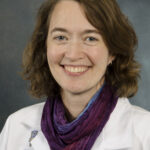ORLANDO, FLORIDA—During the ACR Education Exchange 2023 session, Updates from the Committee on Training & Workforce Issues (COTW), Committee Chair Bethany Marston, MD, associate professor, Departments of Pediatrics and Medicine, University of Rochester, N.Y., began by discussing scholarships for fellows in training (FIT) that will give much needed support to many trainees across the country.
Educational Support for Fellows
The ACR has committed to covering registration fees for ACR Convergence and other ACR events for the next three years for all FIT members based on certain criteria.
For ACR Convergence, senior fellows (meaning second- and third-year adult fellows, third-year pediatric fellows, and third- and fourth-year medicine-pediatrics [med-peds] fellows) will have registration fees fully covered once during their fellowship.
For the ACR Education Exchange/State-of-the-Art Clinical Symposium (SOTA), first-year fellows in adult, pediatric and med-peds rheumatology fellowship training programs will have registration fees covered.
For the Pediatric Rheumatology Symposium (PRSYM), pediatric and med-peds fellows will have registration fees covered once during their fellowship; the meeting occurs every three years.
These scholarships will not cover travel expenses, but the COTW hopes to work on that in coming years.
Subcommittees & More
Dr. Marston also discussed the work of the FIT Subcommittee, currently chaired by Didem Saygin, MD, assistant professor of medicine, Division of Rheumatology and Clinical Immunology, University of Pittsburgh. The subcommittee consists of 10 fellow members, and its goals are to organize the fellows’ educational sessions at SOTA and ACR Convergence, influence FIT volunteer opportunities and enhance FIT educational resources.
The call for applications for the subcommittee opens each year in August, and interested fellows are encouraged to apply.
Among the subcommittee’s many activities this year was the creation of a welcome packet to be mailed to each incoming fellow during the summer.
With respect to the In-Training Examination Task Force, co-chaired by Megan L. Krause, MD, assistant professor, allergy, clinical immunology and rheumatology, University of Kansas Medical Center, Kansas City, and David Leverenz, MD, assistant professor of medicine, Division of Rheumatology and Immunology, Duke University School of Medicine, Durham, N.C., the statistics look excellent in terms of participation. In 2023, 576 FITs took the exam across 136 medical institutions in the U.S., Canada, the United Arab Emirates, Kuwait and Singapore. Scores have been released, and final dates and registration fees for the 2024 exam are to be determined.
The purpose of the In-Training Examination is to serve as a tool for feedback and seek to identify strengths and weaknesses in content knowledge among individual FITs and in curricula across many training programs. This feedback can then be reviewed by fellowship program directors, who can meet one on one with fellows to discuss areas for potential growth and the creation of study plans and self-directed learning that will ultimately increase the chances of passing the American Board of Internal Medicine (ABIM) Rheumatology Board Certification Exam.
Awards
Dr. Marston noted that an important change for fellowship awards from the Rheumatology Research Foundation is that the term now spans a fellow’s entire course of study. This means support will now extend throughout the two years of an adult rheumatology fellow’s program or the three years of a pediatric rheumatology fellow’s program.
Rheumatology training programs are encouraged to apply for workforce expansion funding to increase the number of new fellow slots in a program or to support existing slots that cannot be filled due to lack of funding.
Interview Changes
Among the many changes that came along with the COVID-19 pandemic was the shift from in-person to virtual interviews for residents applying to rheumatology fellowship training programs. Dr. Marston summarized some of the benefits and downsides of this shift to virtual interviews, which continue to be used by many programs and likely will be used into the future.
On the positive side, significant cost savings for applicants and institutions alike have been realized by using virtual rather than in-person interview days. The change has also helped level the playing field with respect to which residents can afford to pay for travel and lodging while going on numerous interviews.
However, there has been a sense of loss in the personal touch of programs and in the inability of interviewees to see the physical space and meet faculty and fellows in real life.
A proposal from the National Resident Matching Program (NRMP) would allow fellowship training programs to voluntarily lock in their rank list of applicants two weeks before resident interviewees are required to do so. This would allow time for residents to visit programs, if they choose to do so, to get the flavor of an institution. Questions remain: Who will sponsor these visits? Will all applicants be invited to visit programs, or only a portion of applicants based on preference of programs? Will this introduce bias into the application process, and will there be issues of equity in funding travel or social activities for perspective fellows? More time is needed to think about the implications of this proposal and to come up with a consistent plan that can be used by programs across the country, Dr. Marston explained.
Engagement Opportunities
Fellows may also apply to be members of ACR standing committees, contribute to RheumPAC, participate in Advocacy 101 (an ACR Government Affairs Committee initiative seeking to enhance the participation of FITs and program directors in health policy and advocacy issues) and write for The Rheumatologist (upon article review and acceptance by the editor). In addition, fellows may have the opportunity to work on clinical guidelines being developed for various diseases and clinical topics through initiatives with the ACR.
The session summarized the many initiatives of the COTW. The COTW encourages feedback from all ACR members, thus the talk not only provided a great summary, but also opened the door for future discourse.
Jason Liebowitz, MD, completed his fellowship in rheumatology at Johns Hopkins University, Baltimore, where he also earned his medical degree. He is currently in practice with Skylands Medical Group, N.J.



